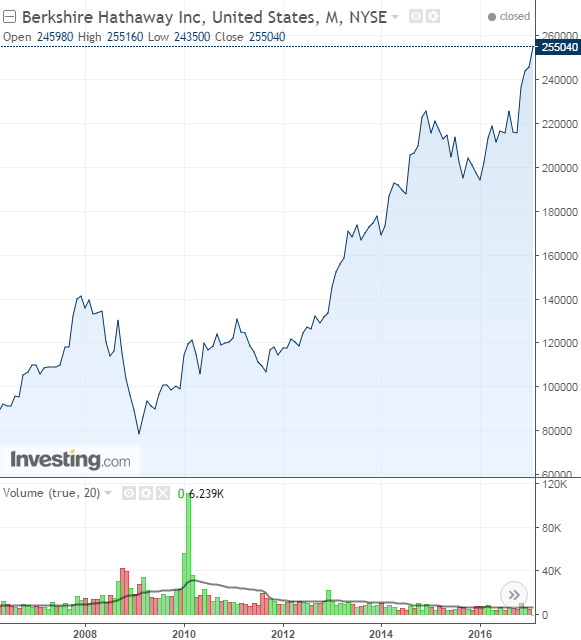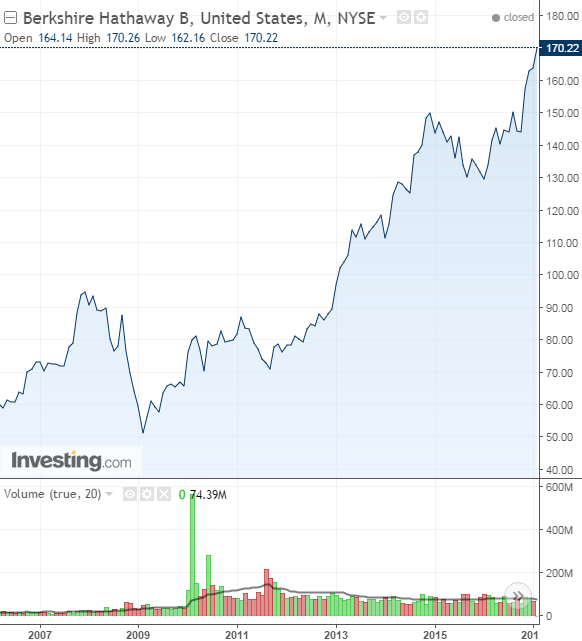by Clement Thibault
On Saturday, Warren E. Buffett, CEO of Berkshire Hathaway ((NYSE:BRKa) and (NYSE:BRKb)), and one of the most vaunted and successful investors of the 20th century, released his much anticipated annual shareholder letter. Born in Nebraska in 1930, Buffett has been interested in business and investing since early childhood.
Today, at 87, he still heads the company he began buying in 1961 and which he took control of in 1965. Currently, Berkshire Hathaway, the former textile company which now operates as a holding company in the financial and casualty insurance sector, has a market cap of $416 billion. Buffet has a personal net worth valued at over $75 billion, making him one of the world's richest individuals.
Buffett's annual shareholder letters are published on the last Saturday of February or the first Saturday of March and have become market events. The letters themselves, always written in Buffett's distinctive, folksy style, are a must-read for anyone interested in stocks, investing or business in general.
Buffett usually provides an overview of the different businesses Berkshire owns, offers a deeper look at the holding company's investments and uses the platform as a way to communicate his opinion about all things finance-related. In this year's letter, written in simple language with a healthy dose of humor, Buffett opens up about his opinion of share repurchases, "adjusted" GAAP earnings and hedge funds. And once again he reiterates his faith in America, despite recent political upheaval. As in previous years, it's delightful reading.
Berkshire Hathaway's holdings include 64 wholly owned subsidiaries such as Burlington Northern Santa Fe railroad, Duracell batteries and See's Candies, as well as minority stakes in 43 publicly traded companies including General Motors (NYSE:GM), Davita Healthcare (NYSE:DVA) and Goldman Sachs (NYSE:GS).

Berkshire shares are divided into two classes: Class A stock, which sells for $255,000 a share, and class B stock, who sells for a 1,500th of the price (or $170.22 as of Friday's close) and holds 1,500th of the stock rights and 1/10,000 of the power per share. Buffett explained that the high price-per-share of Class A stock filters out traders and short-term investors—which is why these shares will never be split.

Class B stock was issued in 1996 to allow middle class investors to own shares of Berkshire Hathaway, after Class A shares were already trading for over $30,000 per share. On January 21, 2010, Class B stock was split 50-1, offering average investors an even easier entry point at about $126 per share.
Among Berkshire's wholly owned subsidiaries are a number of insurance companies such as GEICO, Gen Re, and Berkshire Hathaway insurance. Buffett's penchant for insurance companies isn't surprising, considering he once called gambling "a perfect way to raise money." While casinos rely on an individual's desire to win money, insurance companies bank on their fear of risk and loss aversion. Professor Daniel Kanheman, a Nobel Prize winner in the field of behavioral economics, explained in his prospect theory that our loss aversion is at a ratio of 2 to 3, meaning we dislike losing 2 to 3 times more than we like winning. If so, owning an insurance company is an even a smarter play than owning a casino, while still keeping one's moral high ground.
Privately owned companies aside, the 43 minority holdings in Berkshire Hathaway's portfolio are worth a total of $147 billion dollars. Since Berkshire is obligated to provide quarterly reports on the state of its holdings, we can do a deep drill-down into what can be considered Buffett's portfolio—even though Berkshire employs several money managers to handle the portfolio's day-to-day activity.
Here are 4 lessons from Berkshire's holdings:
1. Diversify sparingly
Diversification is always touted as one of the most important components of a smart investment strategy, in order to minimize overall portfolio risk. However, over-diversification can often hobble a portfolio, hurting potential returns. Though Berkshire Hathaway has a stake in 43 publicly traded companies across a variety of sectors, it is far less broadly diversified then that number would indicate.
BRK's top three holdings overall—Kraft Heinz (NASDAQ:KHC), Wells Fargo (NYSE:WFC) and Coca Cola (NYSE:KO)—account for 48% of the total value of public company holdings, or $71 billion dollars. The top 10 publicly traded holdings constitute 81% of the portfolio's value. If you include the top 20 holdings, that's 93% of the portfolio, or $147 billion.
The sectors in which Berkshire Hathaway invests are also limited. A bit more than one-third of the portfolio, at 34%, is in the financial sector while 31% of the holdings are consumer staples. Almost two-thirds of the portfolio is invested in those two sectors alone. Other significant sector stakes include technology (recently acquired Apple (NASDAQ:AAPL) stock) which accounts for 6% of the portfolio, and Industrials at 5% of the portfolio.
Of course, diversifying assets remains the best way to protect your portfolio's overall value. However, it is important not to spread your funds too thinly. It appears the diversification sweet spot is somewhere between 15 and 20 stocks across 3-5 sectors.
2. Establish rules, but break them when necessary
Warren Buffett famously said that his favorite holding period is forever, and that if you don’t feel comfortable holding a stock for 10 years, you shouldn’t own it for 10 minutes. This of course, is completely in line with his own personal philosophy of buying good businesses and holding them over the long run.
However, Buffett doesn't hesitate to break this rule when necessary. In contrast to positions in Coca Cola and American Express (NYSE:AXP) that have been in Berkshire's portfolio since 1987 and 1964 respectively, Berkshire held a position in Deere & Company (NYSE:DE) for only four years, from 2012-2016, which was sold off, possibly because of a recession in the agriculture sector. The company had a stake in in Kinder Morgan (NYSE:KMI) for just one year, from 2015-2016, bought by Buffett's managers, not by the Oracle of Omaha himself. The company also owned positions in Exxon Mobil (NYSE:XOM) on and off from 2009 to 2014.
Obviously, the divested holdings tend to be the exceptions within Buffett's portfolio rather than the rule, but even with a strict investing philosophy, one must be flexible enough to acknowledge mistakes or capitalize on a surprising opportunity.
3. There's no shame in changing your mind, or your biases
For a long time, Buffett famously hated airlines after a bad experience with debt purchased from US Airways back in 1989. He called the airline industry "a death trap for investors," and in 2002 offered a short analysis of the industry by saying:
You've got huge fixed costs, you've got strong labor unions and you've got commodity pricing. That is not a great recipe for success.
However, this past September, surprise surprise – Berkshire initiated a position in not one but four major US airlines: Delta (NYSE:DAL), Southwest (NYSE:LUV)), American (NASDAQ:AAL) and United Continental Holdings (NYSE:UAL). Berkshire then doubled down on the position during the last quarter and now has over $9 billion tied up in the aviation industry, a little more than 6% of the portfolio. Times change and as they do, it's only natural for circumstances and opinions to change concurrently. Don’t be afraid to reevaluate your opinion of a company or an industry based on new data.
4. Don't pass up dividends
What do Berkshire's top 80% of publicly traded holdings have in common? As you might have guessed from the subtitle, each is a dividend payer. Yields range from #9 holding Delta Airlines' 1.59% to #3 Coca Cola's 3.56%. Nevertheless the principle applies to most of Buffett's buys– companies need to return value to their shareholders, and dividends are one of the best ways to do this.
Buffett's investing style—holding forever—also allows him to reap the benefits of a growing dividend. For example, Buffett began to build his position in Coca Cola after the market crash in 1987, when shares of the company were going for $2.2-2.5 apiece. Today, Coca Cola, which trades for $41.78 as of Friday's close, pays a nominal dividend of $1.38 annually. Coke's yearly dividend is now yielding 26% on shares purchased back in the late '80s, a pretty amazing return.
Ironically, given Buffett's love of dividends, Berkshire Hathaway itself doesn't pay one. His reasoning on this is simple: he prefers to plow profits back into the business in order to grow the company, continue making acquisitions and increase Berkshire's book value. Buffett believes that over the long haul, Berkshire's expansion will return more value to shareholders than a quarterly dividend.
Warren Buffett himself once said, "When people tell me they've learned from experience, I tell them the trick is to learn from other people's experience." Without doubt, we can all learn a few things from Uncle Warren.
